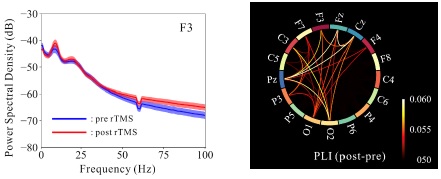2022.01.18
Oscillatory brain network changes after transcranial magnetic stimulation treatment in patients …
Ryo Mitoma, Shunsuke Tamura, Hiroshi Tateishi, Takako Mitsudo, Ichiro Tanabe, Akira Monji,Yoji Hirano*
Journal of Affective Disorders Reports
DOI: doi.org/10.1016/j.jadr.2021.100277
- Possible Biomarker for rTMS Treatment -
Participating in a six-week repetitive transcranial magnetic stimulation (rTMS) treatment in patients with treatment-resistant depression appears to make measurable oscillatory brain network changes associated with improved cognitive function.
In a study that appeared in the Jan. 3 issue of Journal of Affective Disorders Reports, a team led by Kyushu University Hospital (Yoji Hirano, Ryo Mitoma, and Shunsuke Tamura), with collaboration with Saga University Hospital (Hiroshi Tateishi and Akira Monji), reported the results of their study, the first to document oscillatory brain network changes in theta-band (left figure) and increased resting-state gamma power (right figure) after rTMS for treatmentresistant depression using clinical EEG settings. The results suggest that the connectivity indices of neural oscillations that are detectable using clinical EEG can be used as neurophysiological markers of the effects of rTMS on cognitive function in patients with treatment-resistant depression.
shimada 
Authors: Ryo Mitoma, Shunsuke Tamura, Hiroshi Tateishi, Takako Mitsudo, Ichiro Tanabe, Akira Monji, Yoji Hirano*
Journal : Journal of Affective Disorders Reports
DOI: https://doi.org/10.1016/j.jadr.2021.100277
Corresponding Author: Yoji Hirano M.D., Ph.D
Affiliation : Department of Neuropsychiatry, Kyushu University, Fukuoka, Japan

